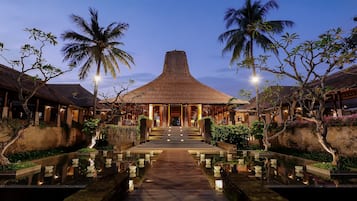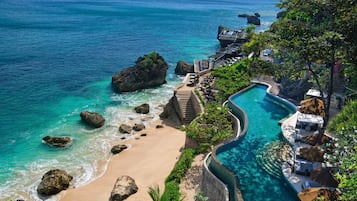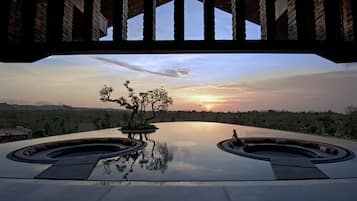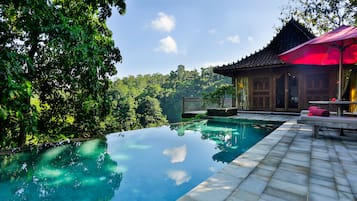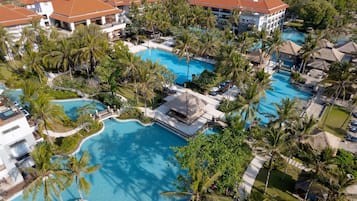Bali offers unique sights that you’ll unlikely see elsewhere, and even if you think you’ve seen them all, there are many other hidden spots waiting for you to discover. For the adventurous at heart, we’ve compiled the most unusual places to visit on the island. Some spots are outright bizarre, while others are eerie and mysterious – spread out across Bali, from the remote central highlands to the offshore island of Lembongan.
You might want to break away from the confines and usual offerings of your luxury resort and seek out the unknown, the odd, and the peculiar in Bali. If you think you’ve seen Bali's temples, here are some outright exceptional ones. Discover the island's strangely beautiful, and beautifully strange, and satisfy your curiosity with our list of unusual and odd places to visit in Bali.
- 1
Taman Festival Bali
Sanur
- Halpa
- Pariskunnat
- Perheet
- Historia
- Valokuvaus
- Uniikki
Lue lisääSanur has a spooky ‘ghost town’ at Padang Galak Beach, a remote coast about 7 km north of the main Sanur hub. It’s the vast ruins of Taman Festival Bali, a theme park that was shut down shortly after its establishment in 1997 due to marketing and financial difficulties, before being handed over to the local government.
The park's deserted main entrance gates, ticket booths, empty cafeterias and deteriorated main buildings with partially collapsed roofs all give it a creepy sensation even in broad daylight. Dense foliage and creeper vines have grown over broken windows, and ornamental stone figures loom over in the open spaces, making it a great post-apocalyptic setting to try your nerves. The locals believe that long-abandoned sites like Taman Festival Bali eventually become inhabited by lost spirits. Take extra caution while you're here as the crumbling structures can cause injuries.
Osoite: Jalan Padanggalak No.3, Kesiman, Denpasar, Bali, Indonesia
Kartta - 2
Trunyan Village
Kintamani
- Seikkailu
- Uniikki
Lue lisääFor something truly macabre, head up to the highlands where the ancient Bali Aga (native Balinese) village of Trunyan lies. The village is on the eastern side of the Batur Lake and usually requires a boat trip from the other side. While the general Balinese Hindus are known for their lavish cremation ceremonies, the people of Trunyan don't cremate or bury their dead.
Instead, the deceased are wrapped and brought by boat to a designated village graveyard. They're laid out on the ground around a large ancient fragrant tree, with a wooden cage covering and protecting the remains from scavenging animals. This tree, known as the ‘taru menyan’ (which the village also gets its name from), is known to only grow in Trunyan. Quite puzzling to many is no odour from the decomposing bodies is present, which the locals believe is neutralised by the tree’s myrrh-like fragrance. Skulls and bones on moss-covered stairs are quite the scene here – definitely not for the nervous type.
Osoite: Trunyan Village, Batur, Kintamani, Bangli, Bali, Indonesia
KarttaValokuva: Paracetamol (CC BY-SA 3.0) muokattu
- 3
The 'bat cave' temple of Goa Lawah
Klungkung
- Historia
- Valokuvaus
Lue lisääAs one of Bali's most important temples, Goa Lawah may not be a well-kept secret. But the odd sight of a majestic Balinese Hindu temple complex built around an eerie cave opening that is inhabited by bats might give you the creeps... even in broad daylight. The 11th-century temple is an easy stopover on most tours to Candidasa. The best time to visit is during dusk, when the hordes of nectar bats swarm the skies over the temple to feast on airborne insects.
During the Piodalan temple anniversaries, Goa Lawah's scene becomes truly exotic with pilgrims in temple attire carrying colourful parasols and banners. One mystery that's yet to be solved is whether the legend that tells of the secret cave passage through to Besakih Temple, some 25 km northeast at the foot of Mount Agung, is true.
Osoite: Jalan Raya Goa Lawah, Pesinggahan, Dawan, Klungkung, Bali, Indonesia
Kartta - 4
Bengkala Village
North Bali

- Uniikki
Bengkala, a village in the district of Kubutambahan in north Bali, is known as the ‘village of the deaf’ due to over 2% of its population being congenitally deaf. The village has seen high incidences of deafness that spans over 7 generations. Its people, known locally as ‘kolok’, have developed a sign language known as ‘kata kolok’.
The kolok people have developed their own style of performing arts, from deaf dances to martial arts. They also have a unique social system for carrying rituals and social roles. There is a belief in a deaf god, which both the deaf and hearing villagers share.
Osoite: Bengkala Village, Kubutambahan, Buleleng, Bali, Indonesia
Kartta - 5
Lost plane #1
Jimbaran

- Halpa
- Historia
- Valokuvaus
- Uniikki
When you're going along Jalan Bypass Ngurah Rai from the airport towards Nusa Dua, keep your attention to the left as around 500 metres from the Benoa Square and right beside Dunkin Donuts is a bizarre old white Boeing 737. The plane is parked in a yard, and rumour has it that the owner had plans to make it into a quirky restaurant, but all fell through and this abandoned plane now just sits as a nice (and Insta-worthy) spot for passersby.
Osoite: Jalan Bypass Ngurah Rai No.63, Kedonganan, Badung, Bali 80361, Indonesia
Kartta - 6
Lost plane #2
Bukit Peninsula

- Valokuvaus
- Uniikki
One of 4 abandoned planes in Bali, this Boeing 737 is in a slightly hidden location up in the hilly limestone area of the southern Bukit Peninsula. Surrounded by a wall of shipping containers, the site is within only 1 km north of Pandawa Beach and sits on a privately-owned hectare of a carved limestone hill. You can usually visit and take photos of this abandoned aircraft for a small fee.
Osoite: Jalan Raya Nusa Dua Selatan, Kutuh, Badung, Bali 80361, Indonesia
Kartta - Lue lisää
The Goa Giri Putri Temple is one of Nusa Penida Island’s major cultural attractions. This large cave temple is in the village of Suana, on the north-eastern part of Penida. Clear signs along the Jalan Ped-Buyuk main road lead you to the site.
A shrine and a priests’ praying shelter guards its entrance, which is a narrow opening in a rock face. You'll need to stoop down low to be able to squeeze and get through. Inside, you’ll discover a spacious temple courtyard. Floorings before the main shrines in the cave’s corner are partly covered in white marble.
Osoite: Suana, Nusapenida, Klungkung, Bali 80771, Indonesia
Kartta - 8
Gala-Gala Underground House
Nusa Lembongan Island

- Pariskunnat
- Perheet
- Historia
- Valokuvaus
- Uniikki
One of the most likely stopovers on your visit to Nusa Lembongan Island is the Gala-Gala Underground House (Goa Gala-Gala) The limestone underground house started as a passionate cave project by house owner Made Byasa, who was inspired by an episode from the Mahabharata epic in which the Pandawa heroes fled persecution from the Koravas by hiding in a cave.
The project turned into a decade-long building obsession, and Goa Gala-Gala was completed in 1976. After the 7-metre descent down a hole in the ground, you will be astonished by Made's feat. He successfully built a kitchen, sleeping quarters, and a living room deep underground.
Osoite: Jungutbatu, Nusa Lembongan, Klungkung, Bali 80771, Indonesia
Kartta - 9
The Ghost Palace Hotel (Bedugul)
Bedugul, Central Bali

- Historia
- Valokuvaus
- Uniikki
Bali's so-called Ghost Palace Hotel is an abandoned mountain resort that you will easily notice on your trip to the central highland, particularly on your visit to the Beratan Lake or the Ulun Danu Temple. The crumbling, abandoned building is the PI Bedugul Taman Rekreasi Hotel and Resort, a project that was halted midway in the early 1990s.
Most locals refrain from entering such a long-abandoned place, as it's rumoured to be haunted. The hotel has been around for approximately 20 years, so extra caution must be taken around the deteriorating structures.
Osoite: Jalan Raya Baturiti, Batunya, Baturiti, Tabanan, Bali 82191, Indonesia
Kartta - 10
The Stalactite Cave Temple of Goa Gong
Jimbaran

- Halpa
- Valokuvaus
- Uniikki
Goa Gong Temple is a unique cave temple hidden away behind the modern development of the Jimbaran resort area. Located 2 km south of the Udayana University campus, Jalan Goa Gong road leads you through the Batu Ngongkong community and a sharp left turn puts you face to face with a pair of big cat statues adorned in red and chequered cloths.
Eerie gargoyles guarding a flight of stairs to the cave opening are just some of the things you'll see at Goa Gong Temple. You're not allowed to enter unless the temple’s supervisor and keeper, priest Mangku Gurun iSimpen, is on site. Inside, a large and dim-lit cavity reveals dedicated stone shrines with soothing sounds of dripping water from the rocky cave’s stalactites. There's a huge stalactite behind the shrines that serves as a functioning stone gong. It is struck during rituals, usually during the temple anniversary.
Osoite: Jalan Goa Gong, Jimbaran, Badung, Bali 80361, Indonesia
Kartta - 11
The dark cave of Goa Peteng
Jimbaran

- Halpa
- Valokuvaus
- Uniikki
Descend into the heart of darkness at Goa Peteng, an impressive natural limestone sinkhole that is located right beside the resort grounds of the AYANA Resort and Spa in Jimbaran. Goa Peteng, literally ‘dark cave’ in the local tongue, is located on a farming field owned by resident Pak Ketjuh and his son Nyoman Suparka.
A large banyan tree with an accompanying shrine guards the cave opening, and daylight becomes scarce after only several down. Vines grow further down into gaps and openings, reaching beyond tight spaces inside the cave. Dense air and bat chirps fill the hollow surroundings. Stalactites and stalagmites shimmer throughout. If you can endure the approximate 150-metre or 15-minute descent, you’ll reach the freshwater pool at its base. It is said that on a full moon, a narrow passage opens as the water level lowers revealing a causeway that leads into a ‘hidden chamber’.
Osoite: Jalan Karang Mas Sejahtera, Jimbaran, Badung, Bali 80364, Indonesia
Kartta - 12
Pura Paluang Car Temple
Nusa Penida Island
- Halpa
- Pariskunnat
- Perheet
- Valokuvaus
- Uniikki
Lue lisääNusa Penida is the largest island among the group of 3 just off Bali’s southwestern coast, but one of the least visited. One site to behold is Pura Paluang, a unique temple complex featuring shrines in the form of a house and automobiles!
As one of the many mysterious temples that dot this remote island, the Paluang Temple (also called Car Temple) can be found located within the local community of Sebun Ibus in the Karangdawa village, on the island’s southern peninsular area.
Osoite: Karangdawa Village, Nusa Penida, Klungkung, Bali, Indonesia
Kartta





